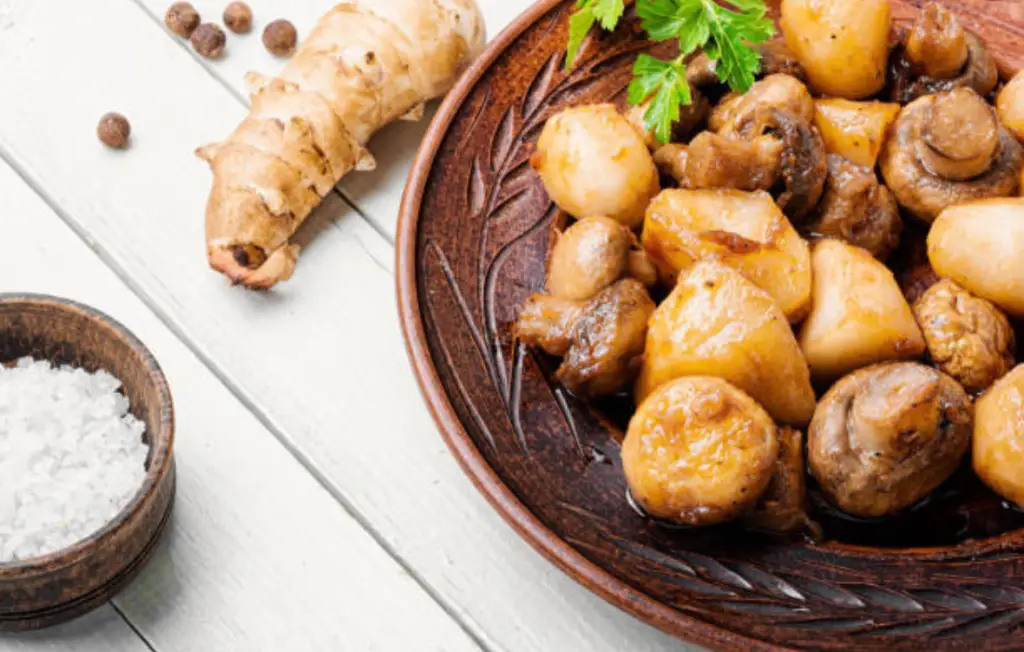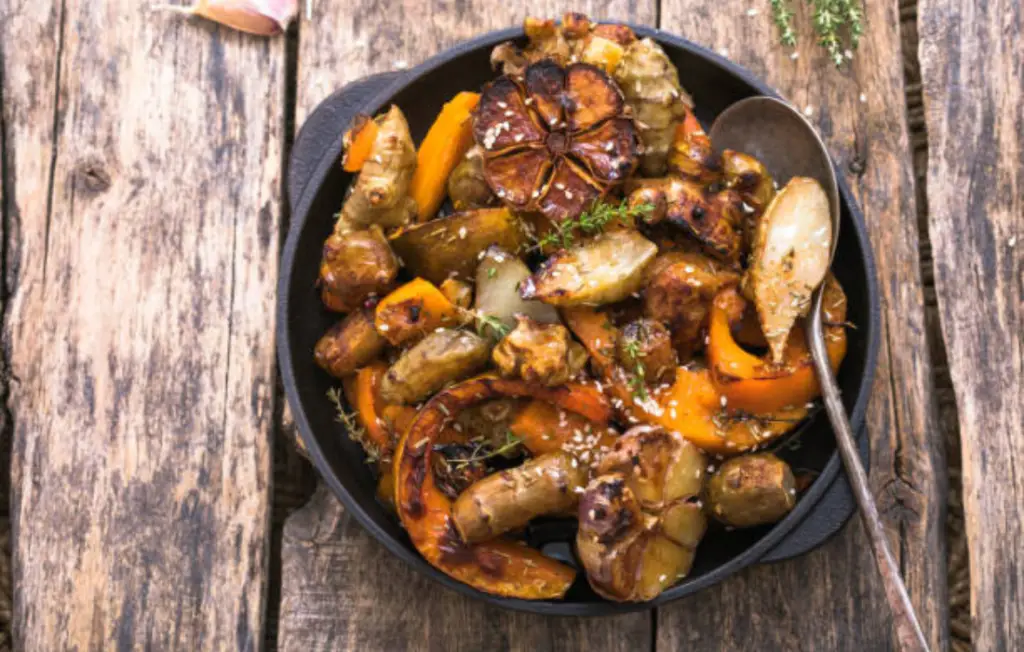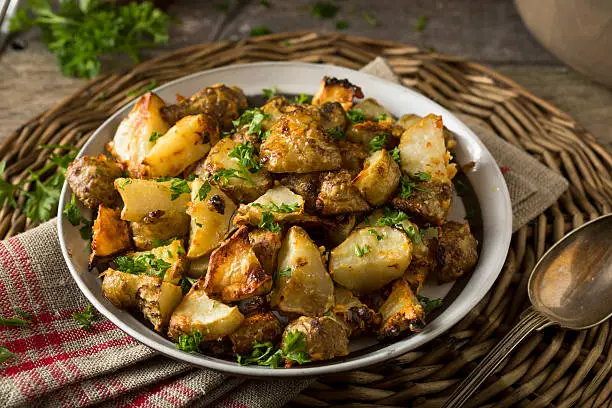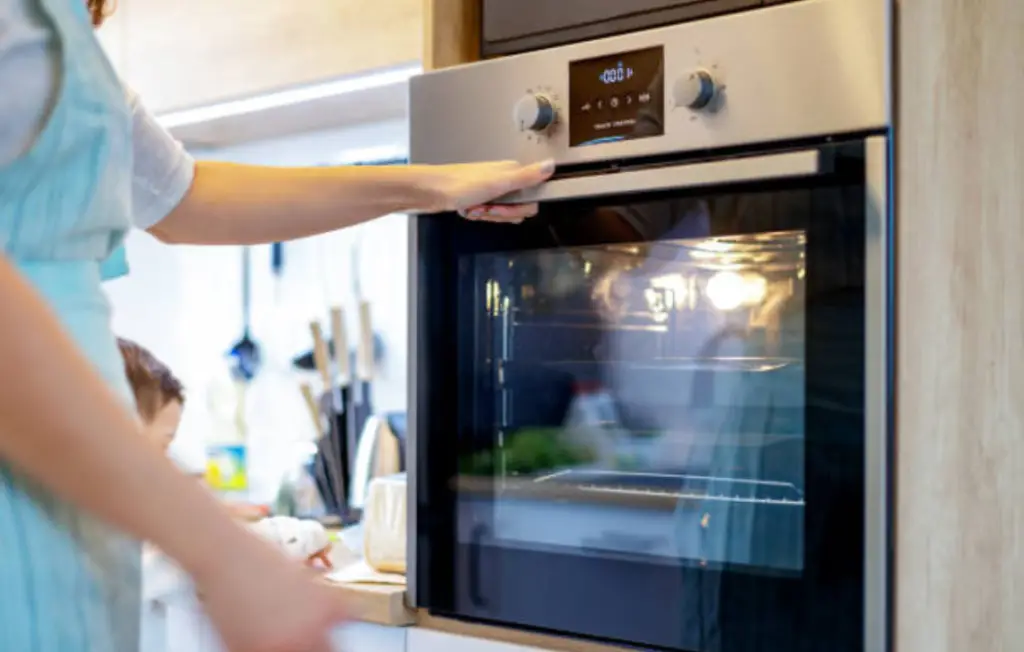Have you ever wondered how to roast Jerusalem artichokes in the oven? As a food enthusiast and home cook, I’ve explored unique flavors and fusion foods, and I’m here to share my tips with you. Let’s dive into the world of these tasty root vegetables and create a delicious side dish that’ll impress your family and friends.
To roast Jerusalem artichokes in the oven, first, clean and slice them into uniform pieces. Preheat your oven to 400°F (200°C), toss the sliced sunchokes with olive oil, salt, and pepper, and spread them out on a baking sheet. Roast for 30-40 minutes, turning halfway through, until they are golden brown and tender.
In this article, we will walk you through the process of selecting, preparing, and roasting Jerusalem artichokes in the oven, while providing expert tips, troubleshooting advice, and dietary adaptations to ensure you create a mouthwatering, healthy, and gluten-free side dish that perfectly complements any meal.

Jerusalem Artichokes
Jerusalem artichokes, also known as sunchokes, are a versatile and delicious root vegetable that can be prepared in various ways. They offer a unique flavor profile and a delightful, earthy taste that can enhance your cooking experience.
Why Roast Jerusalem Artichokes
Roasting Jerusalem artichokes in the oven allows their natural sweetness to shine through while creating a crispy exterior and tender interior. This cooking method enhances their unique flavor and texture, making them a fantastic addition to your culinary repertoire. Plus, roasting is a healthier option compared to frying, as it requires less oil and retains more nutrients.
A Taste of Fusion: Incorporating Jerusalem Artichokes into Your Cooking
As a home cook with a passion for fusion foods, I’ve found that Jerusalem artichokes can bring an unexpected twist to traditional dishes. Their nutty, slightly sweet taste pairs well with a variety of ingredients, making them an excellent choice for creative side dishes or as a component in more complex recipes. From roasted Jerusalem artichoke salads to rich, comforting soups, the possibilities are endless when you start experimenting with these delightful tubers. So, let’s get toasting and roasting some sunchokes!
Selecting and Preparing Jerusalem Artichokes
Picking the right Jerusalem artichokes and preparing them properly will ensure the success of your dish. Here’s what you need to know about choosing and prepping these flavorful root vegetables.

Choosing the Best Jerusalem Artichokes
When shopping for Jerusalem artichokes, look for firm, unblemished tubers with a smooth skin. They should feel heavy for their size and have no soft spots or signs of mold. Smaller sunchokes tend to be more tender and have a milder flavor, while larger ones are slightly nuttier and starchier. Ideally, you should use them within a week of purchasing, as they can become shriveled and lose flavor over time.
Cleaning and Prepping Your Sunchokes
Before cooking, give your Jerusalem artichokes a thorough rinse under cold water. Use a vegetable brush to scrub away any dirt, as their knobby surface can harbor soil. Some people prefer to peel sunchokes, but it’s not necessary – the skin is edible and adds texture to the dish. If you do choose to peel them, be aware that they can discolor quickly once exposed to air, so drop them into a bowl of water with a splash of lemon juice to prevent browning. When you’re ready to cook, slice them into evenly sized pieces to ensure even cooking and optimal crispiness.
The Recipe
Print
Oven Roasted Jerusalem Artichokes Recipe
Enjoy the unique, mildly sweet, and nutty flavor of Jerusalem artichokes by roasting them in the oven. This easy-to-follow recipe delivers a tender, slightly creamy, and delicious side dish that pairs well with various meals.
- Total Time: 45 minutes
- Yield: 4 servings 1x
Ingredients
- 1 lb Jerusalem artichokes (sunchokes)
- 2 tbsp olive oil
- Salt and pepper, to taste
- Optional: garlic powder, rosemary, thyme, or other herbs and spices
Instructions
- Preheat your oven to 400°F (200°C).
- Wash and scrub the Jerusalem artichokes thoroughly, removing any dirt and debris. No need to peel them, as the skin is edible and adds extra flavor.
- Slice the Jerusalem artichokes into even-sized pieces, about 1/4 to 1/2-inch thick.
- In a mixing bowl, toss the sliced Jerusalem artichokes with olive oil, salt, pepper, and any additional herbs or spices you prefer.
- Spread the seasoned Jerusalem artichokes evenly on a baking sheet, making sure they are not overcrowded.
- Roast in the preheated oven for 25-35 minutes, turning halfway through, until golden brown and tender.
- Remove from the oven and serve immediately as a side dish, or let them cool and use them in salads or other recipes.
Notes
Be mindful of portion size when serving to those following a keto diet, as Jerusalem artichokes are relatively low in carbs but not strictly keto-friendly. You can also enjoy Jerusalem artichokes raw by slicing or grating them and adding them to salads or slaws.
- Prep Time: 10 minutes
- Cook Time: 35 minutes
- Category: Side Dish
- Method: Roasting
- Cuisine: International
- Diet: Vegan
Nutrition
- Serving Size: 1/4 of the recipe (approximately 4 oz or 113 grams)
- Calories: 130 kcal
- Sugar: 5 g
- Sodium: 30 mg
- Fat: 7 g
- Saturated Fat: 1 g
- Unsaturated Fat: 6 g
- Trans Fat: 0 g
- Carbohydrates: 17 g
- Fiber: 2 g
- Protein: 3 g
- Cholesterol: 0 mg
Expert Insights
To elevate your roasted Jerusalem artichokes to new culinary heights, consider incorporating some tips and techniques from professional chefs. These experts know the ins and outs of creating amazing dishes with this versatile ingredient.
Tips from Professional Chefs
- Don’t overcrowd the baking sheet: Chefs emphasize the importance of giving your Jerusalem artichokes enough space on the baking sheet to ensure even browning and crispy edges. Overcrowding can lead to steaming, which will result in a less desirable texture.
- Experiment with flavors: Professional chefs often combine Jerusalem artichokes with other ingredients to create unique flavor profiles. Consider adding ingredients like garlic, lemon zest, or balsamic vinegar to your dish for an extra layer of taste.
- Monitor the cooking time: Chefs know that each batch of Jerusalem artichokes can cook differently depending on their size and the oven being used. Keep a close eye on your sunchokes during the roasting process and adjust the cooking time as needed.
- Pair with complementary ingredients: Jerusalem artichokes have a nutty, earthy flavor that pairs well with a variety of ingredients. Chefs recommend serving them alongside proteins like chicken or fish, or incorporating them into dishes with complementary flavors, such as mushrooms, kale, or beets.
- Finish with a garnish: To add a professional touch to your roasted Jerusalem artichokes, consider finishing the dish with a sprinkle of fresh herbs like parsley or chives, or even a drizzle of high-quality olive oil. This small detail can elevate your dish from great to exceptional.

Troubleshooting and Adaptations
Cooking with Jerusalem artichokes can be a rewarding experience, but sometimes you may encounter issues or want to make adaptations for various reasons. Here are some troubleshooting tips and suggestions for seasonal variations and dietary adaptations to ensure your dish is a success.
Troubleshooting Tips
- Uneven cooking: If your Jerusalem artichokes are not roasting evenly, ensure that they are sliced into similar-sized pieces and spread out on the baking sheet with enough space between them.
- Too dry or too oily: Adjust the amount of olive oil to your preference. If the sunchokes seem too dry, add a bit more oil, but if they’re too oily, reduce the amount used.
- Browning too quickly: If your Jerusalem artichokes are browning too fast, try reducing the oven temperature by 25°F (15°C) and extending the cooking time.
Seasonal Variations
- Winter: During the colder months, try adding warming spices like cinnamon, nutmeg, or smoked paprika to your roasted Jerusalem artichokes for a cozy, comforting dish.
- Spring: Pair your roasted sunchokes with fresh, seasonal vegetables like asparagus or peas for a vibrant, refreshing side dish.
- Summer: Toss the roasted Jerusalem artichokes in a light, lemony vinaigrette and serve them over a bed of mixed greens for a delicious summertime salad.
- Fall: Combine your roasted sunchokes with other fall favorites like roasted butternut squash or Brussels sprouts for a flavorful, seasonal dish.
Dietary Adaptations
- Vegan: This recipe is naturally vegan, but you can further enhance the dish by adding nutritional yeast or a vegan parmesan alternative for a cheesy flavor.
- Keto: Jerusalem artichokes are relatively low in carbs, but to make this dish more keto-friendly, consider reducing the portion size and pairing it with a high-fat protein source, like roasted salmon or steak.
- Allergies: If you have an allergy or sensitivity to olive oil, feel free to substitute it with another oil that works for you, such as avocado oil or coconut oil.

FAQs
How long do Jerusalem artichokes last in the fridge?
Uncooked Jerusalem artichokes can last up to two weeks when stored in a cool, dark place, or in the vegetable drawer of your fridge. Cooked artichokes can last up to four days when stored in an airtight container in the fridge.
Can I freeze roasted Jerusalem artichokes?
Yes, you can freeze roasted Jerusalem artichokes. Allow them to cool completely, then transfer them to a freezer-safe container or bag. They can be stored in the freezer for up to three months. Reheat them in the oven for the best texture.
Are Jerusalem artichokes and regular artichokes the same?
No, Jerusalem artichokes and regular artichokes are different. Jerusalem artichokes are tubers, similar to potatoes, while regular artichokes are a type of thistle. Their flavors and cooking methods are also different.
What does a Jerusalem artichoke taste like?
Jerusalem artichokes, also known as sunchokes, have a unique, mildly sweet, nutty, and earthy flavor. Their taste is often described as a cross between an artichoke heart and a potato, with a hint of sweetness similar to that of a water chestnut. The texture of Jerusalem artichokes is crisp when raw, but they become tender and slightly creamy when cooked.
Can you eat Jerusalem artichoke raw?
Yes, you can eat Jerusalem artichokes raw. When eaten raw, they have a crunchy texture similar to that of a water chestnut or jicama. You can slice or grate them and add them to salads, slaws, or veggie platters. It is essential to wash and scrub the tubers thoroughly before consuming them raw to remove any dirt and debris. Keep in mind that some people may experience mild digestive discomfort from eating raw Jerusalem artichokes due to their high inulin content, a type of fiber that can cause gas and bloating in some individuals.
Conclusion
In conclusion, roasting Jerusalem artichokes in the oven is a simple and delicious way to enjoy these unique, flavorful tubers. With their mildly sweet, nutty, and earthy taste, they make a versatile addition to your meal rotation. Remember to select fresh, firm sunchokes, and experiment with different seasonings and serving suggestions to suit your taste buds. Don’t hesitate to try them raw or incorporate expert tips from chefs and stay-at-home moms for an even more enjoyable culinary experience. By following the step-by-step guide and troubleshooting tips provided in this article, you’ll soon master the art of roasting Jerusalem artichokes to perfection. Happy toasting!

